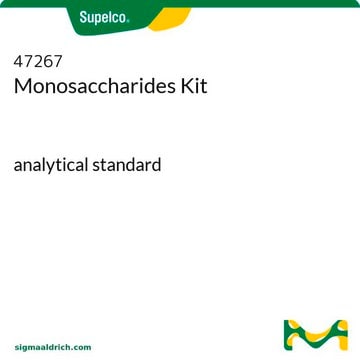91852
D-(+)-Cellobiose
analytical standard
Synonym(s):
β-D-Glc-(1→4)-D-Glc, 4-O-β-D-Glucopyranosyl-D-glucose
About This Item
Recommended Products
grade
analytical standard
Quality Level
Assay
≥98% (HPLC)
optical activity
[α]/D 34±1°, c = 10 in H2O
shelf life
limited shelf life, expiry date on the label
analyte chemical class(es)
oligosaccharides
mp
239 °C (dec.) (lit.)
application(s)
food and beverages
format
neat
SMILES string
OC[C@@H](O)[C@@H](O[C@@H]1O[C@H](CO)[C@@H](O)[C@H](O)[C@H]1O)[C@H](O)[C@@H](O)C=O
InChI
1S/C12H22O11/c13-1-4(16)7(18)11(5(17)2-14)23-12-10(21)9(20)8(19)6(3-15)22-12/h1,4-12,14-21H,2-3H2/t4-,5+,6+,7+,8+,9-,10+,11+,12-/m0/s1
InChI key
DKXNBNKWCZZMJT-WELRSGGNSA-N
Looking for similar products? Visit Product Comparison Guide
General description
Application
- Training, testing, and external validation of the gradient retention model developed in ion chromatography using the artificial intelligence-quantitative structure retention relationship (QSRR) model approach.
- Amperometric detection of the analyte in anion-exchange chromatography using copper/cupric oxide nanostructured electrode.
D-(+)-Cellobiose may be used as an analytical reference standard for the quantification of the analyte in caramel samples using gas–liquid chromatography coupled to mass spectrometry (GLC–MS).
Storage Class Code
11 - Combustible Solids
WGK
WGK 3
Flash Point(F)
Not applicable
Flash Point(C)
Not applicable
Choose from one of the most recent versions:
Already Own This Product?
Find documentation for the products that you have recently purchased in the Document Library.
Customers Also Viewed
Our team of scientists has experience in all areas of research including Life Science, Material Science, Chemical Synthesis, Chromatography, Analytical and many others.
Contact Technical Service









